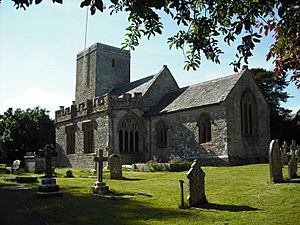Robert Jacobe facts for kids
Sir Robert Jacob (1573–1618) was an English lawyer who served as the Solicitor General for Ireland from 1606 to 1618. He was a close friend and colleague of Sir John Davies, who was the Attorney General for Ireland. Both men were important figures in the government of Ireland during this time.
Contents
Early Life and Family Connections
Robert Jacob was born in 1573 in Higher Bockhampton, a village in Dorset, England, which is now part of Stinsford. He was the second son of Robert Jacob and Anne Steldon. His family had lived in Tolpuddle since the 1400s. Robert was proud of his connection to both Tolpuddle and Bockhampton. When he received his coat of arms, he called himself Robert Jacob of Tolpuddle and Bockhampton.
Around 1603, Robert Jacob married Mary Lynch (who died in 1622). Mary was the daughter of William Lynch, a merchant from Southampton. She had a son from her first marriage, William Targett, who became a soldier. Robert and Mary had five children together: Robert junior, Arthur, Francis, Mary junior, and Anne.
Becoming Solicitor General
We don't know much about Robert Jacob's early education or when he started his legal career. He was made a knight in 1601. In 1606, he was sent to Ireland to serve as the Solicitor General. This important job meant he was a chief legal advisor to the government. He joined the King's Inn, a place for lawyers, in 1607. Like many successful people of his time, he helped his family members find jobs. For example, his brother Hammett became the Clerk of the Peace for Dublin.
Serving in Parliament
Robert Jacob also became a member of the Irish House of Commons. He represented Carlow, a new town that had just been given the right to elect members. This was during the Parliament of 1613–1615. The election in 1613 had many disagreements. Robert Jacob, who was an English settler, believed that Irish lawyers were causing problems for the Crown. He complained that they were electing "seditious schismatics" (meaning Roman Catholics) to Parliament. However, in the end, Protestants had a small majority in the Commons. Robert was also made a Burgess of Carlow Corporation, which meant he was a leading citizen in the town.
Robert Jacob was a skilled lawyer. He often handled cases in the Court of Castle Chamber, which was like Ireland's version of the Star Chamber in England. In 1611, he gave detailed legal advice about taking over lands from the O'Farrell family in Longford.
Robert Jacob as a Politician
Like his friend Sir John Davies, Robert Jacob was both a lawyer and a politician. He was very concerned about how England ruled Ireland. After the Flight of the Earls (when many Irish chiefs left Ireland), he warned that there were many idle men who relied on the local gentlemen. He believed that the killing of Sir Cahir O'Doherty in 1608 would bring peace. However, the next year, he worried that Hugh O'Neill might return and cause trouble in Ulster. He thought that if O'Neill came back or if other countries sent help, the people of Ulster might rebel.
In 1612, he wrote a long report about the weaknesses of English rule in Ireland. He suggested two main solutions: bringing back a standing army and moving Irish chiefs out of problem areas. He thought that many English and Scottish settlers should replace them. He believed that ordinary Irish people could be left alone, and loyal Irish chiefs would only need to give up a small part of their land to the Crown. This would also help the Crown earn more money.
During the "Native's Rebellion" in 1615, Robert Jacob remained calm. This was a plan by some Irish nobles to attack English and Scottish settlers in Ulster. He thought the rebellion was poorly planned and not a serious threat. His belief was proven right when the rebellion quickly failed.
Later Life and Death
Robert Jacob was very ambitious and capable. He was well-suited to play a bigger role in Irish affairs if Sir John Davies were to leave his position. However, Robert Jacob died in 1618, while Davies was still the Attorney General.
His widow, Mary, quickly remarried a well-known politician and poet named Christopher Brooke. She continued to use the title Lady Jacob. She had at least one more child, a son named John, and she died in 1622.
Robert Jacob's Character
While Robert Jacob had strict views on the Irish people, he seemed to be a kind person in his private life. In 1617, he wrote a warm letter to his friend Sir John Davies. He was writing about Davies' son Jack, who was deaf and unable to speak clearly. Robert Jacob was encouraging, saying:
"If your son Jack were now put into the hands of some skilful men, he might be brought to speak. For he is wonderfully mended in his understanding of late, for he understands anything that is spoken to him without making any signs, so as it is certain he hath his hearing."
He also enjoyed theatre. It is believed he took part in a play called Cadmus, which was performed at Dublin Castle during Christmas in 1608.
Images for kids
 | Lonnie Johnson |
 | Granville Woods |
 | Lewis Howard Latimer |
 | James West |



